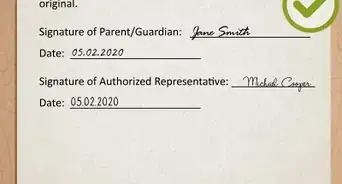This article was co-authored by Clinton M. Sandvick, JD, PhD. Clinton M. Sandvick worked as a civil litigator in California for over 7 years. He received his JD from the University of Wisconsin-Madison in 1998 and his PhD in American History from the University of Oregon in 2013.
There are 10 references cited in this article, which can be found at the bottom of the page.
This article has been viewed 63,142 times.
Individuals with fibromyalgia may suffer from chronic and widespread body pain, fatigue, migraines, memory problems and other symptoms. These symptoms may be so severe that prevents a person’s ability to work. If fibromyalgia prevents you from earning a living you should consider filing a disability claim with the Social Security Administration (SSA). These cases are difficult, but not impossible, to win if you take the right steps.
Steps
Documenting your Illness
-
1Obtain a fibromyalgia diagnosis. Fibromyalgia is a difficult condition to diagnose because there is no specific test. A fibromyalgia diagnosis comes after doctors rule out any other underlying conditions, such as rheumatoid arthritis, that may be causing your symptoms. Doctors will also determine whether you suffered from widespread pain throughout your body for more than three months and other symptoms such as fatigue and impaired memory.[1]
-
2Seek medical care from a specialist. If a family doctor or general practitioner made your initial fibromyalgia diagnosis you should consider seeing a specialist for fibromyalgia. Specialists such as rheumatologists have more experience diagnosing, treating and documenting your fibromyalgia. Proper documentation of your symptoms, diagnosis and pain are important for filing a successful disability claim. [2]Advertisement
-
3Switch doctors if you are not getting support. Fibromyalgia can be a difficult medical condition to diagnose. If you feel that your doctor is not taking your complaints seriously, seems unfamiliar with the condition, or is not moving towards a diagnosis consider seeking a second medical opinion. Another specialist more familiar with diagnosing fibromyalgia may be able to more quickly assess your medical condition and needs.
-
4Obtain a copy of all of your medical records. Before filing a claim for disability or retaining a disability attorney request a copy of all medical records pertaining to the diagnosis, treatment, and documentation of your condition. If your records do not clearly document your condition, you should go to another doctor who will clearly and accurately document your condition.[3]
-
5Have your doctor complete a fibromyalgia residual functional capacity (RFC) form. In assessing your fibromyalgia disability claim, SSA analysts must determine whether you suffer from a medically determinable impairment of fibromyalgia.[4] Your doctor can assist this process by filing out a detailed RFC form that specifies the ways that you are physically/functionally limited and that these symptoms prevent you from working.[5]
-
6Maintain a diary that details your fibromyalgia experience. When seeking disability benefits, you will need to document that your fibromyalgia impairs your life. One way that you can create a record of your symptoms and how the condition has limited your lifestyle is by maintaining a diary. In your diary describe how the condition makes you feel, your level of pain and fatigue, your inability to engage in activities and document your inability to work.[6]
-
7Collect employment records. If fibromyalgia made it impossible for you to continue working, it may be useful to collect employment records that document your absences from work due to your condition. SSA may seek this information prior to deciding on your disability claim.[7]
Retaining an Attorney
-
1Locate a disability attorney in your area. Once you have your diagnosis and collected all of your documentation you may want to consider hiring an experienced disability attorney to handle your SSA disability claim. There are several ways to locate an experienced disability attorney:
- ask for a referral from neighbors, friends or attorneys that you know. A personal recommendation is one of the best ways to find a good attorney.
- call a local legal bar associations. Legal bar associations often provide free referral services to individuals seeking an attorney. You can locate bar associations by performing an internet search for “legal bar association” and the city or state in which you reside.
-
2Attend a free consultation with a disability attorney. Most disability attorneys work on a contingent fee basis, which means that they get paid only after successfully winning your disability claim. Disability attorneys often meet with prospective clients for free before deciding whether to take your case. This meeting provides you an opportunity to discuss your case without any obligation. Be sure to bring all of your medical records to the meeting and consider asking the following questions:
- what fee does the attorney charge after winning the case
- how long does the process take
- what additional records do they require
- how many fibromyalgia cases have they successfully handled
-
3Retain a disability attorney. Once you have met with an attorney(s) you must decide whether you want to hire a lawyer to file your claim or file a claim on your own. Hiring an experienced disability attorney should greatly increase your ability to win your claim. These attorneys know how to navigate the SSA process, speak to judges and claims handlers and file your appeals, if necessary. Fibromyalgia disability cases tend to be more difficult so it may be to you benefit to hire an attorney if you are willing to spend the money. [8]
Submitting a Disability Claim
-
1Apply for disability benefits. Whether you decide to retain an attorney or handle your disability claim yourself, you must first apply for disability benefits. You will need to provide medical records, social security number, contact information for medical providers, employment history, medication information and tax information.[9] You can apply in one of three ways:
- online by visiting the SSA website at http://www.ssa.gov/disabilityssi/apply.html
- calling the SSA’s toll free number 1-800-772-1213 or 1-800-325-0778 if you are dear or hard of hearing and use TTY
- visiting a local Social Security office[10]
-
2Wait for a decision. An SSA analyst will review your disability benefit application and evaluate whether you have a "medically determinable impairment." The SSA will notify you by mail of their decision on your claim. The medical documentation that you collected will be used in making this determination. The SSA uses the following five-step process to evaluate a claim:
- determine whether you are working and if you average earnings exceed a certain amount they will consider you disabled
- determine whether your medical condition is severe enough to limit basic work activities, such as sitting, walking or remembering, for at least 12 months
- determine whether your medical condition is one of their listed impairments that prevents you from working. While fibromyalgia is not one of the officially listed impairments, the SSA has issued guidance on how to evaluate whether fibromyalgia meets the criteria for a “medical determinable impairment” that prevents employment[11]
- determines whether you can perform the work you performed before the onset of your condition
- determines if there is any type of work that you can perform with your medical condition[12]
-
3Accept disability benefits. If your claim was approved, the SSA will notify you by mail and provide you with the effective date of your benefit and the amount of your disability benefit.[13]
-
4Appeal a denial of your disability claim. If the SSA denied your claim for disability benefits, you have the right to appeal that decision but you must do so within 60 days of the date of the denial letter. You can appeal your decision in the following ways:
- online at the SSA [www.socialsecurity.gov/disability/appeal website]
- by calling the SSA 1-800-772-1213 (TTY 1-800-325-0778)
- in person at a local SSA office[14]
-
5Retain a disability attorney. If you have not already done so, you should consider retaining a disability attorney to handle to appeal of your disability claim. The appeals process includes multiple levels of appeal and may be more easily negotiated by an experienced disability attorney. The four levels of appeal include:
- reconsideration—this is a complete review of your claim by someone not involved in the original claim process. You can present new evidence at this stage of the appeal
- hearing by an administrative judge—if you dispute the findings from the reconsideration process you can request a hearing and present your claim to an administrative judge. At the hearing, the judge will review the evidence, question witnesses, and rely on medical experts that you present. You should expect to be questioned and you can question other witnesses as well.
- appeals council—if you dispute the findings from the hearing you can request that the SSA Appeals Council review your claim. They review your materials and if they believe the hearing was correct they will deny your claim by letter.
- federal court—if you dispute the findings of the SSA Appeals Council you can file a lawsuit in federal court challenging the SSA findings
Warnings
- The information provided in this website if for general information only. The information provided here is not legal advice, should not be considered or relied on as legal advice. This article provides information on how to locate an attorney.⧼thumbs_response⧽
References
- ↑ http://www.mayoclinic.org/diseases-conditions/fibromyalgia/in-depth/fibromyalgia-symptoms/art-20045401
- ↑ http://www.disabilitysecrets.com/social_security_disability_fibromyalgia.html
- ↑ http://www.disabilitysecrets.com/applying_for_disability_with_fibromyalgia.html
- ↑ http://www.socialsecurity.gov/OP_Home/rulings/di/01/SSR2012-02-di-01.html
- ↑ http://www.disabilitysecrets.com/resources/disability/rfc-fibromyalgia.htm
- ↑ http://www.disabled-world.com/health/fibromyalgia/fibromyalgia-disability.php
- ↑ http://www.disabilitysecrets.com/social_security_disability_fibromyalgia.html
- ↑ http://www.nolo.com/legal-encyclopedia/when-talk-social-security-disability-lawyer.html
- ↑ http://www.ssa.gov/planners/disability/dapply.html
About This Article
To win a fibromyalgia disability case, start by visiting your doctor to get an official fibromyalgia diagnosis. If your doctor seems unfamiliar with the condition, consider seeing a specialist, like a rheumatologist, for proper diagnosis and treatment. Make sure your symptoms, diagnosis, medications, and treatments are well-documented by your doctors. When you're ready to file, request a copy of all medical records pertaining to your fibromyalgia diagnosis and fill out the required paperwork. If you're worried about completing the process successfully, consider hiring a disability attorney to help you prepare and submit your paperwork to the SSA. For tips on getting your doctor to fill out a fibromyalgia residual functional capacity (RFC) form, read on!




































































